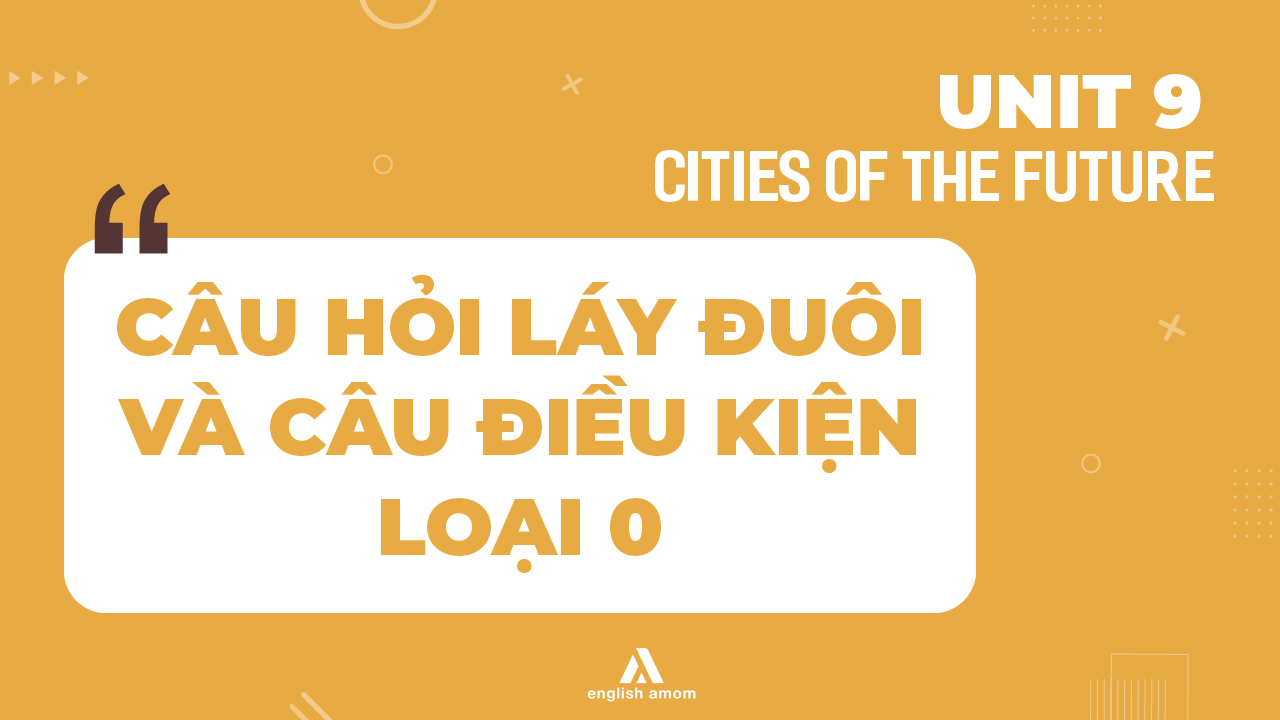
► Kênh hỏi đáp và giải thích thắc mắc kiến thức MIỄN PHÍ → truy cập LINK NHÓM: ENGLISH AMOM
► Kênh YOUTUBE hệ thống toàn bộ bài giảng CLIPS: truy cập LINK: ENGLISH AMOM CHANNEL
► Kênh TIKTOK: ENGLISH AMOM
I. LÝ THUYẾT
A) Question tags (Câu hỏi láy đuôi)
1) Khái niệm câu hỏi láy đuôi
Câu hỏi đuôi là dạng câu hỏi ngắn được thêm vào cuối 1 câu nói trong khi đàm thoại. Câu hỏi đuôi thường được dùng để xác nhận lại thông tin (lên giọng) hoặc tìm kiếm sự đồng thuận (xuống giọng).
2) Công thức câu hỏi láy đuôi
B) Conditional sentences type 0 (Câu điều kiện loại 0)
1) Khái niệm câu điều kiện loại 0
2) Công thức câu điều kiện loại 0
II. BÀI TẬP
1. Match the question tags with the statements to make complete sentences.
ĐÁP ÁN:
1 - c. You’ve seen that film, haven’t you?
2 – h. I'm not disturbing you, am I?
3 – f. People will travel solar-powered cars in the future, won’t they?
4 – d. You have never been to Europe, haven’t you?
5 – g. The package has already arrived, hasn’t it?
6 – a. I think everyone's going to be there, aren’t they?
7 – b. Don't stay up late at night, will you?
8 – e. There'll be no private transport in the future, won’t they?
2. Complete the sentences with the correct question tags.
ĐÁP ÁN:
1. There's no milk in the fridge, is there?
2. You can drive a car, can’t you?
3. I believe nothing serious has happened, has it?
4. Please give me a hand, will / would / could / won't you?
5. Let's review the lesson together, shall we?
6. I think these are your papers, aren’t they?
7. Somebody's just called my name, haven’t they?
8. Jane has got no problems at work, has she?
3. Match the if - clauses with the result clauses.
ĐÁP ÁN:
1 – e. If you freeze water, it turns to ice.
2 – c. If you need help, don’t hesitate to ask.
3 – f. If you remove the battery from your cellphone, it turns off.
4 – a. If you multiply 1 by 0, you get 0.
5 – h. If my father leaves work early on Saturday, he usually goes to the gym.
6 – b. If you've finished your work, go home and take a rest.
7 – d. If you are going to school today, please pick me up on your way.
8 – g. If you try to mix oil and water, the oil goes to the top and the water goes to bottom.
4. Combine the sentences or rewrite them to make conditional sentences. Decide whether to use type 0 or 1.
Example:
You get to the airport early. Wait for me in the lounge.
ĐÁP ÁN:
1. The baby is crying. He may be hungry.
=> If the baby is crying, he may be hungry. / The baby may be hungry if he is crying. (Type 1)
2. You travel on a budget flight, so you have to pay for your drinks and food.
=> If you travel on a budget flight, you have to pay for your drink and food. (Type 0)
3. Whenever the weather is fine. I walk to work instead of driving.
=> If the weather is fine, I walk to work instead of driving. / I walk ... if the weather is fine. (Type 0)
4. People start using more solar energy. There will be less pollution.
=> If people start using more solar energy, there will be less pollution. (Type 1)
5. They usually play soccer when they have no homework.
=> If they have no homework, they usually play soccer. (Type 0)
6. You travel by train. It takes five hours to get to Nha Trang.
=> If you travel by train, it takes five hours to get to Nha Trang. (Type 0)
7. The government plans to reduce the use of fossil fuels. Our city will become a more liveable place.
=> If the government reduces/manages to reduce the use of fossil fuels, our city will become a more liveable place. (Type 1)

